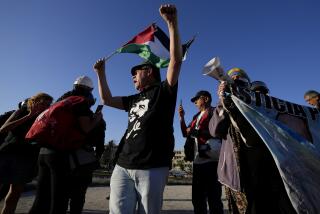Egyptians cast votes on constitutional amendments
- Share via
Reporting from Cairo — They waited for hours in long lines, but they weren’t impatient. They knew that when they emerged from polling stations and proudly waved fingers stained with pink ink, they would have freely expressed their will at the ballot box — at last.
More than 45 million Egyptians were eligible to vote Saturday on a set of constitutional amendments designed to pave the way for parliamentary and presidential elections later this year. Many said it was a cathartic moment that began to purge years of pent-up political frustration and elections draped with a democratic fig leaf during the decades of former President Hosni Mubarak’s rule.
“Finally, we have our moment to speak our mind,” said 22-year-old college student Mohammed Abdel Ghani, who grinned widely as he waved a sign for passing cars that read: “It doesn’t matter whether you vote ‘yes’ or ‘no,’ just vote!”
Ghani was among hundreds crowding a polling station in a section of Cairo’s Nasser City, where many live in cramped government housing. They waited three hours to vote, and when they emerged, waved inked fingers signifying they had voted.
In interviews, the voters were deeply divided on the merits of the constitutional amendments, but they expressed almost uniform confidence that the process would be fair.
The balloting was held in full view of independent election monitors, and an estimated 16,000 members of the judiciary held ultimate authority over the counting procedures at more than 54,000 polling stations nationwide. An additional 36,000 security personnel were meant to ensure that voters faced no intimidation.
“This is a historic day for Egypt,” Deputy Prime Minister Yahya Gamal told reporters after casting his vote in Cairo. “I had never seen such large numbers of voters in Egypt. Finally, the people of Egypt have come to realize that their vote counts.”
The proposed amendments limit future presidents to two four-year terms, ensure judicial supervision of elections, eliminate restrictions on the formation of political parties and require a popular referendum before the country’s controversial emergency law is used for more than six months. The law has been used to detain political dissidents and others without charge.
Without reliable polling, no one could predict how the results would turn out, but the onetime opposition Muslim Brotherhood and remnants of Mubarak’s former ruling party were strongly in favor of the amendments.
The rest of the political spectrum seemed to be opposed, including many of the youth organizations at the center of the revolution. They unsuccessfully pressed to have the vote delayed, sensing that momentum was turning their way in the final week.
“My worry is that these amendments don’t do enough to curtail presidential power. I think they leave a huge opening for another dictator to emerge,” said 27-year-old architect Mohammed Osama.
Mohammed Gamel, a 22-year-old engineering student who said his views were aligned with the Brotherhood, said he was strongly in favor of the amendments.
“These amendments will help us get through these next months with some stability and help us move quickly to democracy,” Gamel said.
The Brotherhood seemed well positioned to capitalize on speedy elections because of its superior organization compared with a large number of newly emerging political parties.
That had many Coptic Christians worried. The Christians make up more than 10% of the population and already face entrenched discrimination. Many have been marginalized in menial jobs.
“Some people, and not just the Brotherhood, are trying to scare us by saying that if we vote ‘no,’ then the military will take over the country for a long period,” said Youssef Latif, a 22-year-old student in Helwan, south of Cairo, standing near a Christian church burned this month.
“The Brotherhood’s message reminded me of the same tactics of spreading fear that Mubarak’s regime used,” Latif said. “We need not to be scared or afraid of anything anymore.”
Hassan is a news assistant in The Times’ Cairo bureau.
More to Read
Sign up for Essential California
The most important California stories and recommendations in your inbox every morning.
You may occasionally receive promotional content from the Los Angeles Times.














